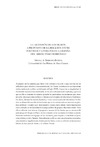Please use this identifier to cite or link to this item:
https://accedacris.ulpgc.es/jspui/handle/10553/15563
| DC Field | Value | Language |
|---|---|---|
| dc.contributor.author | Perdomo Batista, Miguel A. | en_US |
| dc.date.accessioned | 2016-01-30T03:30:32Z | - |
| dc.date.accessioned | 2018-03-15T14:36:10Z | - |
| dc.date.available | 2016-01-30T03:30:32Z | - |
| dc.date.available | 2018-03-15T14:36:10Z | - |
| dc.date.issued | 2010 | en_US |
| dc.identifier.issn | 1136-3169 | en_US |
| dc.identifier.other | Dialnet | - |
| dc.identifier.uri | https://accedacris.ulpgc.es/handle/10553/15563 | - |
| dc.description.abstract | Al amparo del tío paterno, que llamó a los sobrinos a la corte y supo servirse de sus influencias para situarlos convenientemente, los Iriarte constituyeron un importante núcleo intelectual y político en la España del siglo XVIII. A pesar de su singularidad, la formidable ascensión del clan familiar no ha sido suficientemente explicada, a pesar de que en ella se concitan de manera ejemplar las particulares circunstancias que orientaron las relaciones entre políticos y literatos en la España del absolutismo borbónico. | en_US |
| dc.description.abstract | Under his father’s side uncle, who called his nephews to the court and knew how to use his influence to place them conveniently, the Iriarte were an important intellectual and political center in the Spain of the eighteenth century. Despite its uniqueness, the amazing rise of the family clan has not been sufficiently explained, although it arouses in an exemplary manner the particular circumstances that guided the relationship between politicians and writers in Spain during the Bourbon absolutism. | en_US |
| dc.format | application/pdf | - |
| dc.language | spa | en_US |
| dc.relation.ispartof | Philologica canariensia | en_US |
| dc.source | Philologica canariensia [ISSN 1136-3169], n. 16-17 (2010-2011), p. 193-220 | en_US |
| dc.subject | 550510 Filología | en_US |
| dc.subject | 570107 Lengua y literatura | en_US |
| dc.subject.other | Reformismo borbónico | en_US |
| dc.subject.other | Relaciones entre políticos | en_US |
| dc.subject.other | Siglo XVIII | en_US |
| dc.title | Las ascensión de los Iriarte. A propósito de la relación entre políticos y literatos en la España del absolutismo borbónico | en_US |
| dc.type | info:eu-repo/semantics/article | en_US |
| dc.type | Article | en_US |
| dc.identifier.url | http://dialnet.unirioja.es/servlet/articulo?codigo=5287455 | - |
| dc.compliance.driver | 1 | - |
| dc.identifier.absysnet | 234349 | - |
| dc.identifier.crisid | 17846 | - |
| dc.description.lastpage | 220 | en_US |
| dc.identifier.issue | 16 | - |
| dc.description.firstpage | 193 | en_US |
| dc.investigacion | Artes y Humanidades | en_US |
| dc.rights.accessrights | info:eu-repo/semantics/openAccess | - |
| dc.type2 | Artículo | en_US |
| dc.contributor.authordialnetid | 3057748 | - |
| dc.identifier.dialnet | 5287455ARTREV | - |
| dc.utils.revision | Sí | en_US |
| dc.identifier.supplement | 17846 | - |
| dc.identifier.ulpgc | Sí | es |
| dc.description.esci | ESCI | |
| dc.description.erihplus | ERIH PLUS | |
| item.fulltext | Con texto completo | - |
| item.grantfulltext | open | - |
| crisitem.author.dept | GIR Investigaciones literarias y lingüísticas en español | - |
| crisitem.author.dept | Departamento de Filología Hispánica, Clásica y de Estudios Árabes y Orientales | - |
| crisitem.author.orcid | 0000-0002-5019-2368 | - |
| crisitem.author.parentorg | Departamento de Filología Hispánica, Clásica y de Estudios Árabes y Orientales | - |
| crisitem.author.fullName | Perdomo Batista, Miguel Angel | - |
| Appears in Collections: | Philologica Canariensia. n.016-17, 2010-2011 Artículos | |
Page view(s) 10
56
checked on Jan 10, 2026
Download(s)
105
checked on Jan 10, 2026
Google ScholarTM
Check
Share
Export metadata
Items in accedaCRIS are protected by copyright, with all rights reserved, unless otherwise indicated.
